Mastering Values, Leadership, and
Change» (ISBN-13: 978-1405133562)
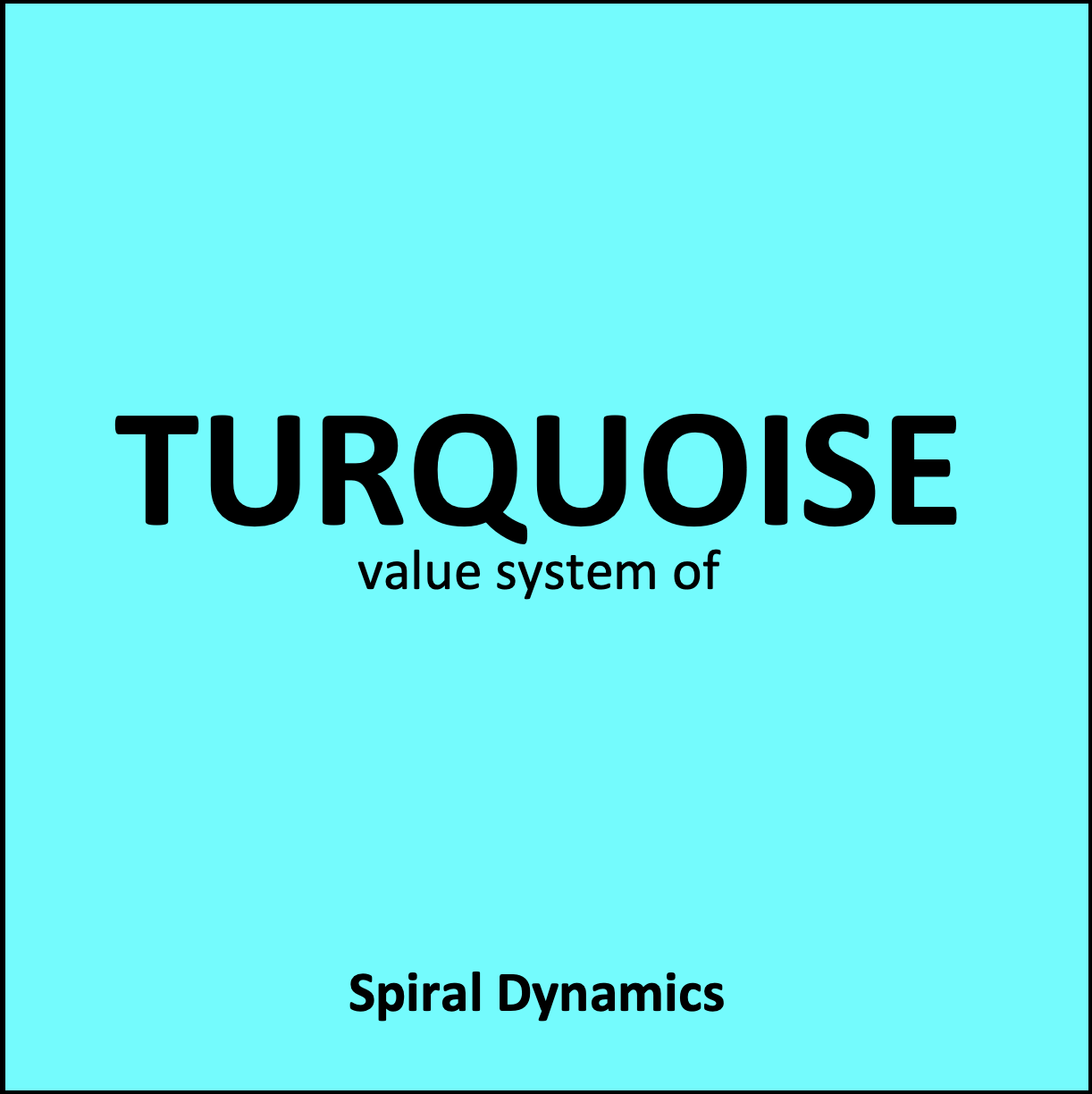
| Color | In a life | In a business |
| Turquoise | The Global vision | Synthesis |
| Yellow | Flexible stream | Win-Win-Win behaviour |
| Green | Interpersonal relations | Social networks |
| Orange | Competition | Project management |
| Blue | The power of truth | Business Process Management |
| Red | The rule of force | Starting up a personal business |
| Purple | Family relations | Family relations |
| Beige | Survival | Own farm |
We invite curiosity about the systemic mechanisms behind this correlation. There may be hidden variables that provide alternative explanations.
0.0663 between the Psychological safety and Turquoise stage.
The critical value of the correlation coefficient for a normal distribution, by William Sealy Gosset (Student) r = 0.0627. This positive correlation of 0.0663 meets the reliability criteria but does not necessarily imply causation.

This positive correlation of 0.0663 resonates with the Turquoise value system's orientation toward interconnectivity, empathy, and inclusion. Seeing existence through a lens of holism, Turquoise psychology recognizes how emotional safety enables vulnerability, creativity, and belonging.
From farming communal practices to indigenous council circles, Turquoise models integrate psychological safety as crucial for cooperation.
Yet, Turquoise thinkers also understand complexity within human systems. Kindness alone cannot surmount all barriers between diverse perspectives or histories.
0.1121 between the Yes, the organization benefits from having a working group to keep the conversation on ageism and Turquoise stage.
The critical value of the correlation coefficient for a normal distribution, by William Sealy Gosset (Student) r = 0.0889. This positive correlation of 0.1121 meets the reliability criteria but does not necessarily imply causation.

The positive correlation of 0.1121 aligns with the Turquoise vMeme, emphasizing the interdependence of human and natural systems. This suggests that individuals at the Turquoise stage may recognize the value of addressing ageism within an organizational context, viewing it through the lens of sustainability and harmony with the natural world.
In the Turquoise worldview, there's a deep understanding of the interconnectedness of all things. This correlation may indicate a broader concern for the well-being of both individuals and the organization, reflecting a desire for inclusiveness, diversity, and a holistic approach to societal issues.
-0.1006 between the State should exercise control over the development of the artificial intelligence / Strongly agree and Turquoise stage.
The critical value of the correlation coefficient for a normal distribution, by William Sealy Gosset (Student) r = 0.0941. This negative correlation of -0.1006 meets the reliability criteria but does not necessarily imply causation.

This negative correlation of -0.1006 reveals the Turquoise tendency toward decentralized governance enabling autonomous innovation for the greater good. As the most interconnected, holistic stage, Turquoise thinkers understand complex systems are best served through distributed coordination - like ecosystems self-regulating through collective intelligence.
While risks exist in rapidly evolving technologies, diversity and responsibility may outpace command control. Thus, Turquoise psychology leans away from unilateral state interference, nurturing social patterns and educational cultures and fostering ethics and wisdom within advancement. Progress and conscience align through shared values in just systems.
However, nuance exists here; unbridled speeds of change challenge even integrative mentalities. And not all innovations bring collective benefit without oversight. We must unpack systemic complexities through many lenses before reaching firm conclusions.
0.1147 between the Active listener and the Turquoise stage.
The critical value of the correlation coefficient for a normal distribution, by William Sealy Gosset (Student) r = 0.0445. This positive correlation of 0.1147 meets the reliability criteria but does not necessarily imply causation.

This positive correlation of 0.1147 between active listening and the turquoise value system is meaningful. It speaks to the turquoise orientation towards deep connection, empathy, and understanding between all aspects of life. At the core is a recognition that we are all part of an interconnected web, so listening carefully and compassionately to all voices is crucial.
We tap into our shared humanity when we listen openly, without judgment. We move past surface differences into deeper realms where we can appreciate each other's intrinsic worth. In this space, creativity and innovation flourish through synthesis and integration. New solutions emerge that benefit all.
At Turquoise, leadership is less about asserting one's own agenda and more about facilitating collective understanding. It's about creating contexts where each person feels heard and valued to reinforce our interdependence. With mindful listening, we can co-create sustainable structures that honor both human needs and environmental balance.
This correlation reminds us that receptive listening and embracing interconnectivity can nourish communities. By tuning into each other with care and wisdom, we build the foundations for a just, compassionate, holistic society.
0.0655 between the Give up their power and the Turquoise stage.
The critical value of the correlation coefficient for a normal distribution, by William Sealy Gosset (Student) r = 0.0616. This positive correlation of 0.0655 meets the reliability criteria but does not necessarily imply causation.

This initially counterintuitive correlation of 0.0655 reveals nuances around power and wisdom at the Turquoise stage. Though strong advocates for equality, Turquoise recognizes that the illusion of control is a weakness.
True power comes from surrender - accepting that we cannot impose our will upon life’s unpredictable flow. By releasing attachment to particular outcomes, we can act flexibly with circumstances as they unfold.
When we cling desperately to power, we suffer. When we acknowledge the inherent powerlessness of our egos, we connect to deeper sources of energy and creativity. We tap into life’s boundless potential rather than boxing it into limited constructs.
From this lens, “giving up power” is not victimhood but cultivating freedom through non-attachment and non-identification. It is anchoring in the eternal NOW rather than what we wish was or might become. This presence and flow state is the ultimate power - and it emerges precisely when we cease grasping.
So, for Turquoise, the correlation suggests surrendering control allows us to harness universal forces far more significant than our wills. It is the wise path to serenity, insight, and influence. By giving up power, we gain access to infinite power.
0.1585 between the I am intensely interested in other people / Strongly Agree and the Turquoise stage.
The critical value of the correlation coefficient for a normal distribution, by William Sealy Gosset (Student) r = 0.06. This positive correlation of 0.1585 meets the reliability criteria but does not necessarily imply causation.

This positive correlation of 0.1585 resonates with the heart of the Turquoise value system: its sense of interconnectedness, empathy, and passion for understanding the human experience.
Turquoise recognizes all people as integral threads in the broader fabric of life. Appreciating diverse stories and perspectives deepens awareness of our shared essence and the contexts shaping each journey.
Curiosity about others also stems from a desire to forge bonds across apparent separation. Finding common ground knits together alliances that support the well-being of people and the planet.
Additionally, Turquoise employs its integrative abilities to synthesize learnings from many vantage points. As more truths are held, opportunities arise for new social configurations to meet everyone's needs.
So, by profoundly affirming each individual’s intrinsic worth, turquoise nurtures the insight that shifting from independence to interdependence may solve seemingly intractable challenges. Openness unlocks breakthroughs.
This explains the vital link between Turquoise and intense interest in people. For Turquoise, all of humanity provides pieces to life’s magnificent puzzle.
0.0742 between the Present and the Turquoise stage.
The critical value of the correlation coefficient for a normal distribution, by William Sealy Gosset (Student) r = 0.0647. This positive correlation of 0.0742 meets the reliability criteria but does not necessarily imply causation.

This positive correlation of 0.0742 resonates with a key dimension of the holistic Turquoise worldview - its emphasis on mindfulness, presence, and grounding in the eternal Now.
While appreciating lessons from the past and maintaining hope for the future, Turquoise recognizes the power of fully inhabiting the current moment. The present comprises all we ever concretely have. Our actions align with evolving realities, not outdated assumptions, by anchoring awareness here and now.
Living in the present also connects us more palpably to the aliveness and interdependence of all beings in this immediate field of energy. We tap into the living matrix binding humanity, realizing our choices intricately impact everyone and everything.
Additionally, excessive future dreaming or past dwelling often breeds anxiety, discontent, and feelings of scarcity. Embracing today’s gifts nurtures gratitude for the abundance already available all around us.
Turquoise correlates with the present focus because we contact radical truth and recognize our embeddedness in flowing ecosystems bigger than our small selves. Savoring now fosters ethics and creativity moment by moment.

0.0514 between the Empathy and the Turquoise stage.
The critical value of the correlation coefficient for a normal distribution, by William Sealy Gosset (Student) r = 0.0431. This positive correlation of 0.0514 meets the reliability criteria but does not necessarily imply causation.

This positive correlation of 0.0514 between valuing empathy and the Turquoise value system makes sense, given Turquoise's orientation toward interconnectedness, compassion, and holism.
Turquoise recognizes that we are all part of a more prominent human family and natural order. This fosters an inclusive mindset that seeks to understand different people and perspectives. Turquoise empathy comes from transcending separateness.
In the workplace, Turquoise types tend to see leadership as empowering others, not self-glorification. Serving the well-being of the team and stakeholders matters more than personal status.
Overall, this correlation reflects how Turquoise's expansive care for all of life naturally enhances empathy. Yet wisdom integrates care for people with the discernment to make difficult leadership decisions when required. Unbounded compassion without discernment is naive.
The integrative nature of Turquoise allows it to synthesize big-picture idealism with situational realism. This holistic empathy, tempered by wisdom, leads to purposeful service of the whole.
0.1822 between the Personal growth. I am not interested in activities that will expand my horizons. / Strongly disagree, and the Turquoise stage.
The critical value of the correlation coefficient for a normal distribution, by William Sealy Gosset (Student) r = 0.0545. This positive correlation of 0.0.1822 meets the reliability criteria but does not necessarily imply causation.

This positive correlation of 0.1822 highlights a significant connection between personal growth and the holistic, integrated perspective associated with this advanced level of human development.
The Turquoise value system represents a highly evolved worldview that recognizes the interconnectedness of all things and values diversity, tolerance, and inclusiveness. Individuals operating from this stage tend to have a deep sense of compassion, empathy, and a strong desire for personal growth and self-expansion.
This correlation suggests that those who align with the Turquoise stage will likely actively seek out activities and experiences that broaden their horizons and contribute to their personal development. They understand that growth is an ongoing process and that exposing oneself to new ideas, cultures, and perspectives is essential for expanding one's understanding of the world and oneself.
-0.1436 between the Age group 25-29 years and the Turquoise stage.
The critical value of the correlation coefficient for a normal distribution, by William Sealy Gosset (Student) r = 0.1283. This negative correlation of -0.1436 meets the reliability criteria but does not necessarily imply causation.

This negative correlation of -0.1436 makes sense, given that the Turquoise value system represents a holistic, integrated, and ecological perspective. Recognizing the interconnectedness of all things and focusing on sustainability, harmony with the natural world, and the well-being of people and the planet characterizes it. Individuals operating from this stage tend to be driven by compassion, empathy, and a desire for inclusiveness.
In the context of this correlation, individuals at the Turquoise stage, with their holistic and expansive worldview, may be less likely to belong to the specific age group of 25-29 years. This could be due to several factors:
-0.1010 between the Career opportunities and the Turquoise stage.
The critical value of the correlation coefficient for a normal distribution, by William Sealy Gosset (Student) r = 0.0644. This negative correlation of -0.1010 meets the reliability criteria but does not necessarily imply causation.
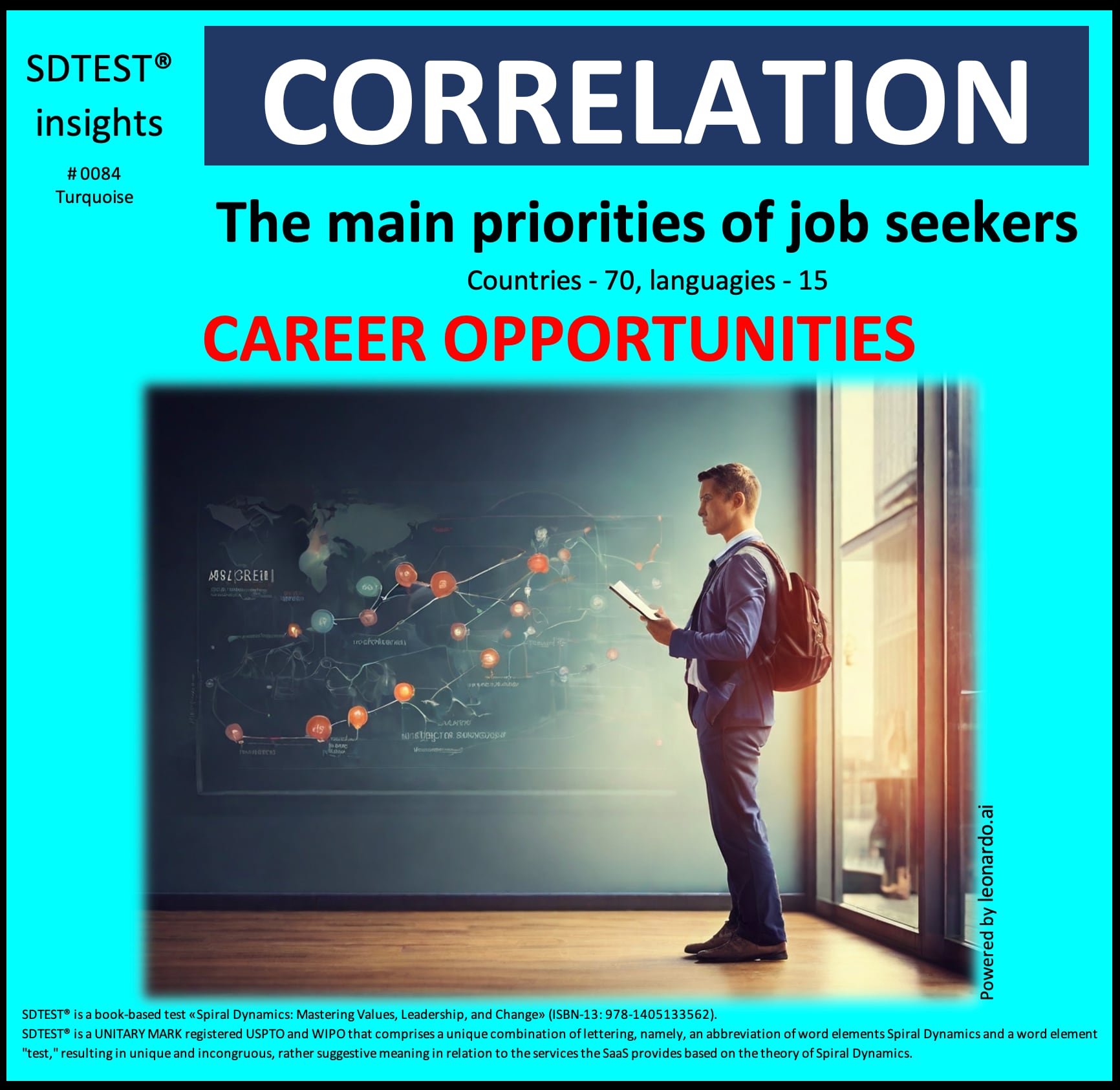
This negative correlation of -0.1010 exceeds the critical value of 0.0644 and meets the reliability criteria for further examination, and could be explained by the Turquoise stage's tendency to transcend traditional career-centric paradigms and embrace a more holistic and purpose-driven approach to work and life.
Individuals at the Turquoise stage may be less inclined to prioritize traditional notions of career advancement or personal ambition, as their worldview is centered on the collective well-being of all and a recognition of the interdependence between human and natural systems.
Furthermore, the Turquoise value system's emphasis on sustainability, ecological harmony, and a deep connection to the natural world could lead individuals to prioritize roles or opportunities that align with these values rather than solely focusing on personal career advancement.
-0.0926 between the Age group 25-29 years and the Turquoise stage.
The critical value of the correlation coefficient for a normal distribution, by William Sealy Gosset (Student) r = 0.0833. This negative correlation of -0.0926 meets the reliability criteria but does not necessarily imply causation.
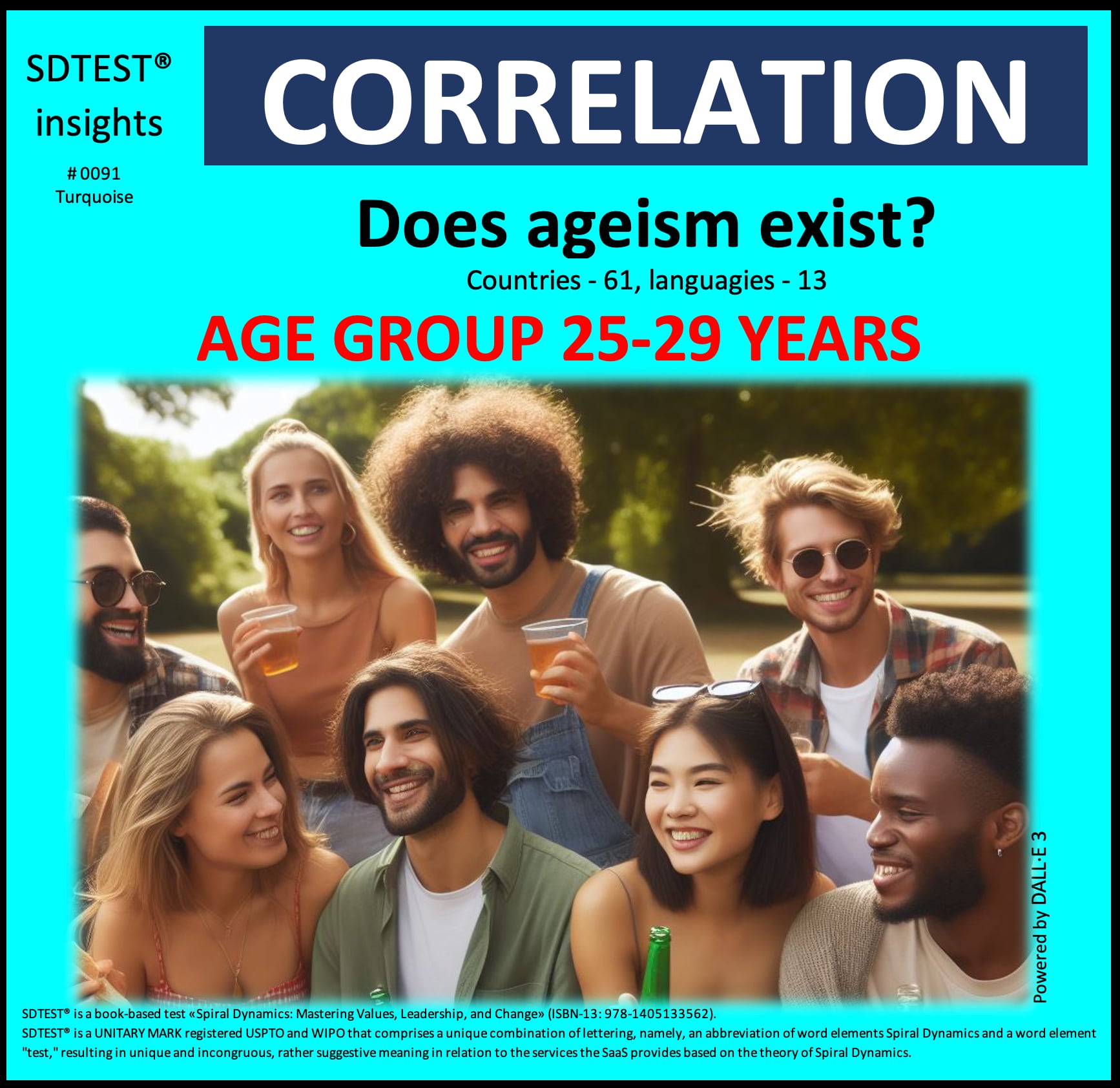
This negative correlation of -0.0926 exceeds the critical value of 0.0833; it meets the reliability criteria for further examination and could be explained by the following factors:
The Turquoise value system represents a holistic, integrated, and ecological perspective characterized by a recognition of the interconnectedness of all things, a focus on sustainability, and a concern for the well-being of people and the planet. Individuals operating from this stage tend to be driven by compassion, empathy, and a desire for inclusiveness.
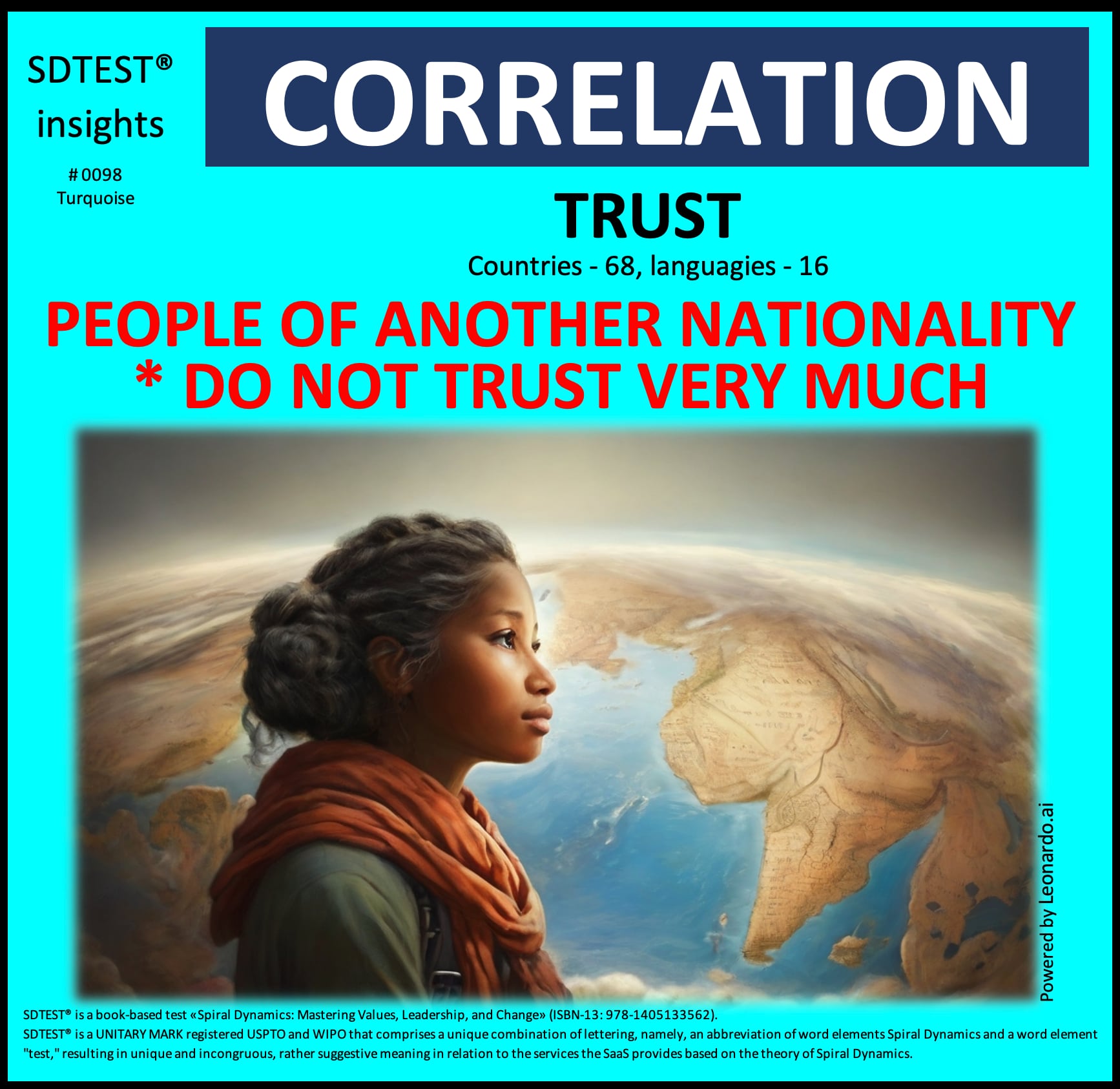
0.1356 between the Seeing things from another point of view / Strongly Agree and the Turquoise stage.
The critical value of the correlation coefficient for a normal distribution, by William Sealy Gosset (Student) r = 0.0813. This positive correlation of 0.1356 meets the reliability criteria but does not necessarily imply causation.
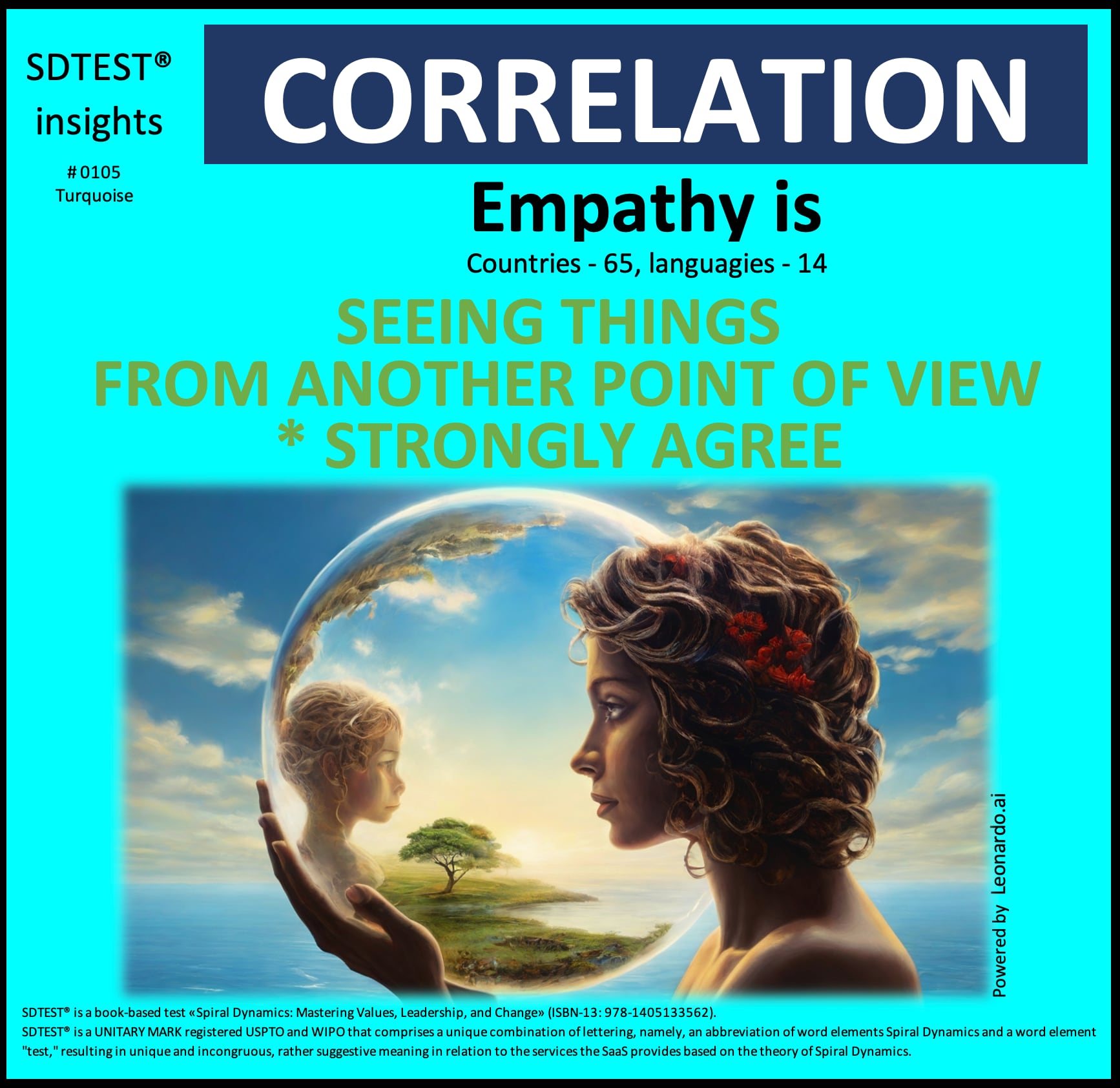
This positive correlation of 0.1356 suggests a relationship between strongly agreeing that empathy involves seeing things from another's point of view and individuals operating within the Turquoise stage of value system development. Those aligned with the Turquoise worldview tend to associate more with this understanding of empathy.
From the Turquoise value system's lens, this correlation reflects the emphasis on holistic thinking, recognizing diverse perspectives, and fostering a deep sense of interconnectedness and compassion for all beings.
The Turquoise worldview values the ability to transcend narrow viewpoints and embrace multiple perspectives, recognizing the inherent complexity and interdependence of human experiences and natural systems. The capacity to see things from another's point of view is a fundamental aspect of this holistic and integrative approach, enabling individuals to cultivate a deeper understanding and appreciation for the diverse tapestry of life.
Furthermore, the Turquoise value system is characterized by a strong sense of empathy and a deep concern for the well-being of both people and the planet. The ability to empathize and consider alternative perspectives is essential for fostering meaningful connections, promoting inclusivity, and developing sustainable solutions that account for the interconnected nature of human and environmental challenges.
It is important to note that this positive correlation does not necessarily imply a lack of self-awareness or a complete abandonment of personal perspectives within the Turquoise value system. Instead, it reflects a conscious effort to expand one's understanding and embrace the richness of diverse experiences, recognizing that genuine empathy and holistic solutions require the integration of multiple viewpoints.
0.3847 between the Keep private information confidential (Respecting secrets earns respect in return) / Agree strongly and the Turquoise stage.
The critical value of the correlation coefficient for a normal distribution, by William Sealy Gosset (Student) r = 0.3807. This positive correlation of 0.3847 meets the reliability criteria but does not necessarily imply causation.

This positive correlation of 0.3847 suggests a relationship between strongly agreeing with the importance of keeping private information confidential as a way to build trust and individuals operating within the Turquoise stage of value system development. Those aligned with the Turquoise worldview tend to exhibit a higher association with recognizing the significance of respecting privacy and confidentiality.
The Turquoise worldview recognizes the interconnectedness of all life and the interdependence of human and natural systems. Within this context, respecting the privacy and confidentiality of individuals is a fundamental aspect of honoring the sanctity of personal boundaries while promoting trust and harmony within the broader interconnected web of relationships.
Furthermore, the Turquoise value system is characterized by a strong sense of inclusiveness, tolerance, and a desire for sustainability and harmony with the natural world. Maintaining confidentiality and respecting individuals' private spheres is necessary to create an environment that fosters trust, mutual understanding, and the coexistence of diverse perspectives and experiences.
It is important to note that this positive correlation does not necessarily imply a disregard for transparency or open communication within the Turquoise value system. Instead, it may reflect a nuanced understanding of the delicate balance between respecting individual privacy and fostering trust, essential for building sustainable and harmonious relationships within interconnected systems.
0.1151 between the Yes, I am ready to receive 15% less pay to work remotely and the Turquoise stage.
The critical value of the correlation coefficient for a normal distribution, by William Sealy Gosset (Student) r = 0.0655. This positive correlation of 0.1151 meets the reliability criteria but does not necessarily imply causation.
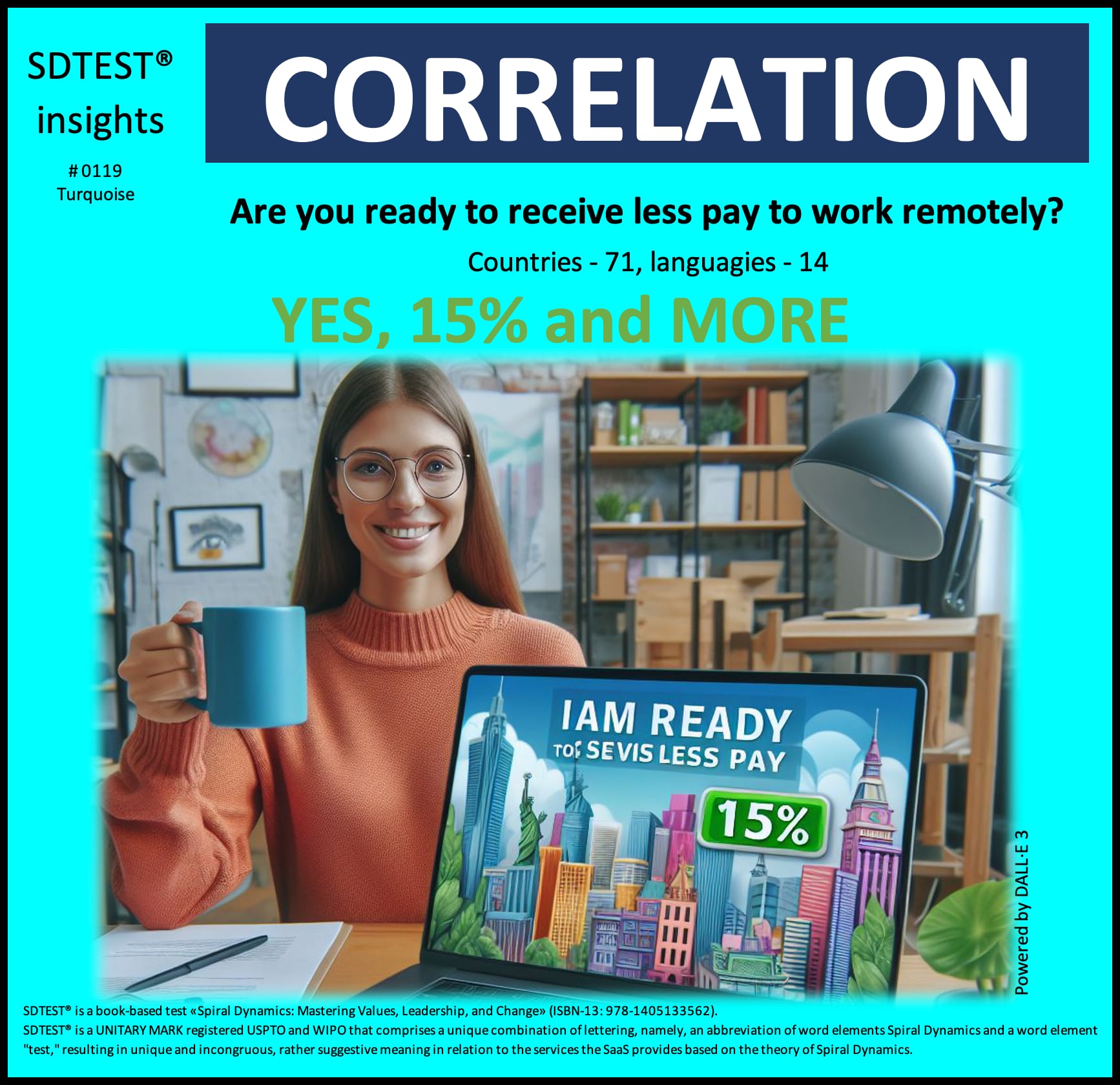
The positive correlation of 0.1151 could be explained from three points of view:
1. Companies operating within the Turquoise value system:
Companies embracing this value system may be more open to flexible work arrangements that prioritize the well-being of their employees and the planet. Turquoise-aligned companies may recognize the potential benefits of remote work, such as reduced commuting time and carbon emissions. They may offer reduced pay as a trade-off for these benefits.
2. Teams operating within the Turquoise value system:
Within teams operating in the Turquoise value system, the positive correlation may indicate a greater appreciation for the interconnectedness of personal, professional, and environmental well-being. Team members may view remote work as balancing personal and professional responsibilities while contributing to a more sustainable future. This holistic approach to work may foster a more collaborative and supportive team environment where individuals feel valued for their unique contributions and are encouraged to prioritize their well-being.
3. Individuals within the Turquoise value system:
For individuals operating within the Turquoise value system, the positive correlation may reflect a deep commitment to sustainability and the well-being of both people and the planet. These individuals may be more likely to prioritize remote work to reduce their carbon footprint and contribute to a more sustainable future, even if it means accepting reduced pay. This holistic, integrative approach to work and life may lead to a more fulfilling and meaningful career path, where individuals are valued for their unique contributions and are encouraged to prioritize their well-being and the planet's well-being.
What insights do you gain from these correlations?
We welcome respectful and wise perspectives!
After login or registration, free access to the poll results in the FAQ section.
